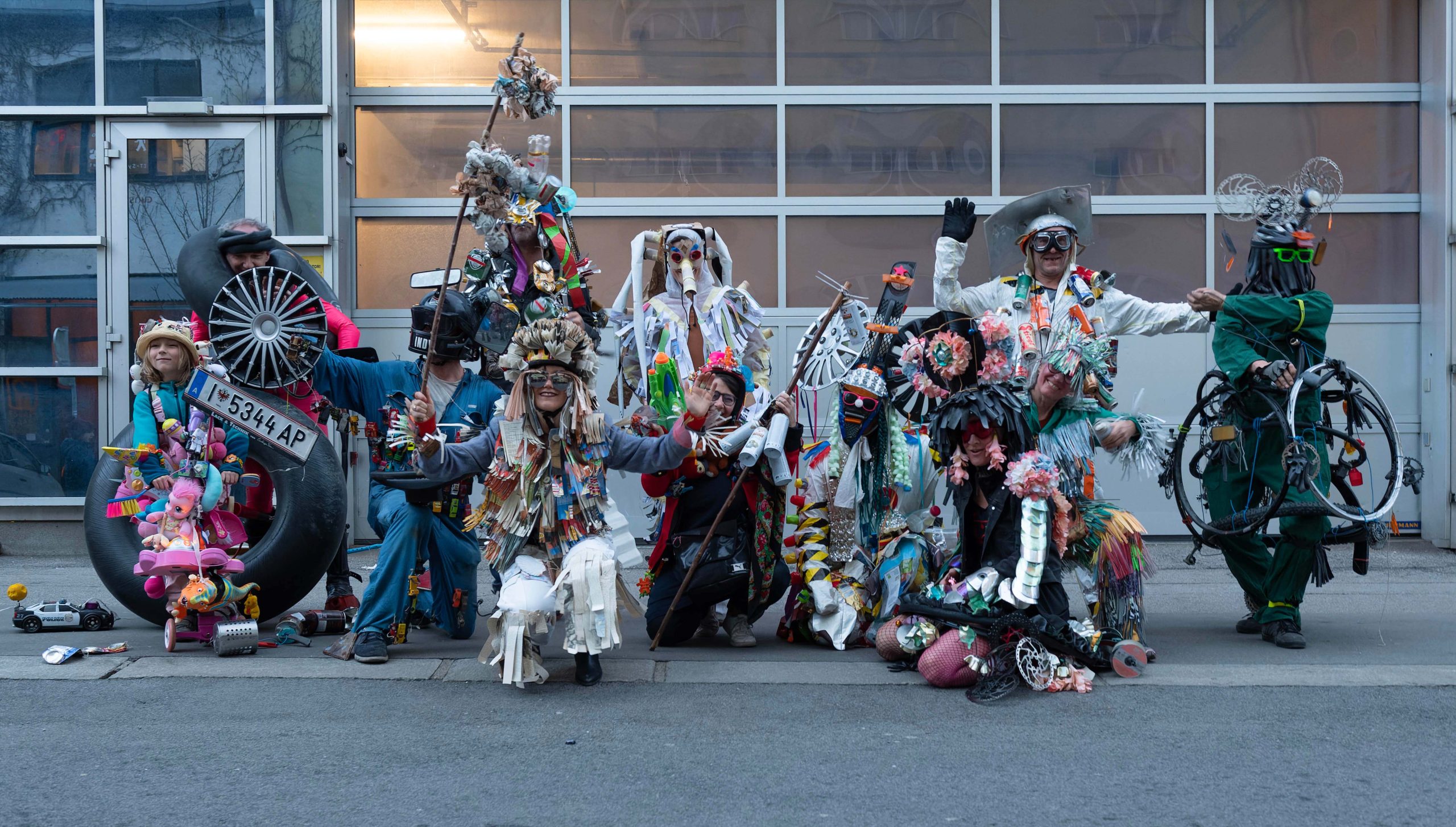
19 Sep. OPENSPACE.INNSBRUCK
FR, 08.11.
13:00-17:00 Uhr
OFFENES ATELIER
OPENSPACE.INNSBRUCK
MullMulla offene Werkstatt / Atelier im Rahmen der PREMIERENTAGE 2024
Die MullMulla sind eine Performance-Gruppe, die mit Masken, Kostümen und Tanz das Bewusstsein für eine nachhaltige Lebensweise und Lebensfreude fördern. Ihre Kostüme und Masken bestehen aus Materialien, die allgemein als Müll gelten, definiert als nutzlose Nebenprodukte der Konsumgesellschaft.
In Anlehnung an einen regionalen Volksbrauch, die „Muller“, die jedes Jahr im Spätwinter in den umliegenden Dörfern von Innsbruck auftreten, um Fruchtbarkeit und jahreszeitliche Erneuerung zu „sichern“, adaptieren die MullMulla traditionelle Masken, Kostüme und Bewegungen, um die Herzen und Köpfe der Menschen mit der Kraft künstlerischer Aktion zu erreichen. Als „Müll-Dämonen“ tanzen sie für einen respektvollen Umgang mit globalen Ressourcen. Es ist eine weltweit verbreitete kulturelle Praxis, Bedrohungen und Ängste zu bannen, indem man sie als Masken darstellt und inszeniert. Die MullMulla verlagern die Absicht des magischen (künstlerischen, symbolischen) Eingriffs in die Naturgewalten mittels Maskentanz von dem Ziel, die Rückkehr des Frühlings zu sichern, hin zu dem Ziel, eine zerstörerische Lebensweise zu überwinden und ein nachhaltiges Leben auf der Grundlage von Kreislaufprozessen zu fördern. Das traditionelle Muller-Brauchtum ist tief in einer patriarchalen, bäuerlichen Gesellschaft verwurzelt, die nur noch als nostalgische Fiktion existiert. Dennoch darf das „Mullern“ bis heute nur exklusiv von „alteingesessenen“ Männern praktiziert werden. Die MullMulla sind hingegen ein für alle Menschen jeglichen Geschlechts und jeglicher Herkunft offenes Kollektiv (MullER wird zu MullA).
Beim Workshop am 8.11., von 13:00 bis 17:00 Uhr, im Open Space werden Masken und Kostüme aus jeglicher Art von „Müll“ angefertigt. Es werden einfache Tanzschritte geübt und eine gemeinsame Choreografie für den Auftritt am 9.11., von 16:00 bis 16:30 Uhr, erarbeitet. Alle Workshopteilnehmer*innen sind auch eingeladen, an der Performance mitzuwirken (einzige Voraussetzungen sind eine Maske und ein Kostüm aus Müll).
MullMulla, Wilten, 2023 © Patrick Ausserdorfer
The MullMulla are a group of performers aiming to promote awareness of a sustainable lifestyle and joy of living through masks, costumes and dance. Their costumes and masks are made of materials commonly regarded as trash, defined as useless by-products of our consumer society.
Referring to a regional popular custom, the Muller, who annually, in late winter, reappear in the villages around Innsbruck in order to secure fruitfulness and seasonal renewal, the MullMulla adapt traditional masks, costumes and moves in order to reach the hearts and heads of the people through the force of artistic action. As trash demons they dance for a respectful handling of global resources. It is a common cultural practice around the world to ward off threats and fears by depicting and staging them as masks. By way of their masked dance, the MullMull take the intention of a magical (artistic, symbolic) intervention in the forces of nature away from the goal of securing the return of spring and turn it towards the goal of surmounting a destructive lifestyle and promoting a sustainable life on the basis of natural cycles. The traditional Muller custom is deeply rooted in a patriarchal, farming society, which only continues to exist as a nostalgic fiction. Still, the Muller custom to this day is an exclusive privilege for the men of long-established families. The MullMulla, on the other hand, are a collective open to people of all genders and origins.
At the workshop at Open Space, on November 8, from 1 until 5 pm, masks and costumes will be made from all kinds of trash. Moreover, dance steps will be rehearsed, and a joint choreography created for the performance on November 9, from 4 until 4:30 pm. All participants in the workshop are also invited to take part in the performance themselves (the only requirements being a mask and a costume made of trash).

